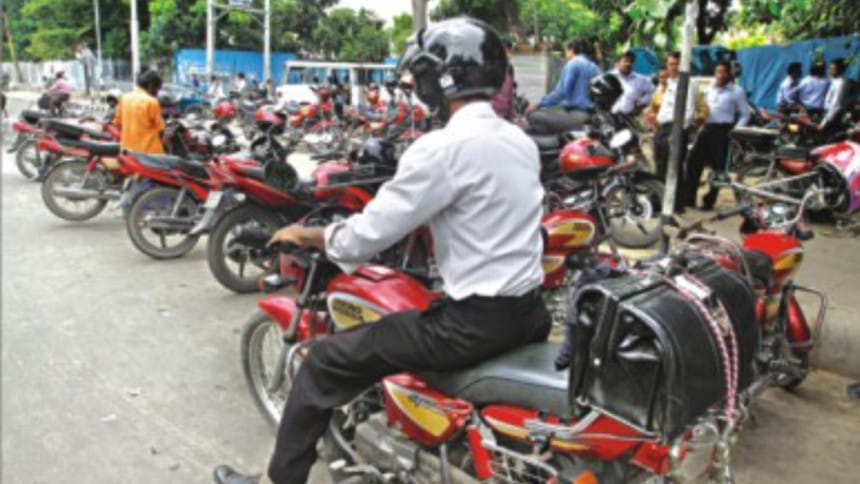Men with the medicines

Marketing a product is not easy. And if the product is a pharmaceuticals item in a competitive market then the job becomes tougher. A medical promotion officer (MPO) does that hard job.
The MPOs talk for medicines, mainly to doctors. They are the marketing lifeline for the pharmaceutical companies, as promotion of any sort or advertisements are strictly prohibited.
These medical representative officers describe the features of medicines to physicians who prescribe those. The MPOs are also known as medical representative officer or medical information officer and medical services officer.
A day of an MPO starts at around 8am and continues till 2pm in the first half when they visit mainly hospitals. They go out for private clinics and dispensaries in the second half of the day that extends from around 4.30pm till the close of the centres.
"Sometimes, doctors prefer us to the literature provided with the medicines, to know where and how to use the products," says Moshiur Rahman, an MPO with Beximco Pharma.
"It's all about describing the medical products perfectly."
The MPOs need to have a clear idea about the products they deal with, to inform the doctors on the qualities and field of usage. Each MPO promotes 125 to 150 products on an average.
"It was tough at first to remember all the names and properties of the medicines. But later, it becomes easier," Rahman says.
Ahmed Kamrul Alam, assistant general manager of Square Pharmaceuticals Ltd, says: "It's not an easy job. We prepare them with a rigorous training of two to three months."
At present, 203 pharma-ceuticals in operations out of the 255 registered produce medicines of not less than 19,484 brands, according to Bangladesh Association of Pharmaceutical Industries (BAPI).
All the pharmaceutical products are divided into over 1,000 generics and 40 dosage forms. But none in the Tk 7,000 crore industry can say how many MPOs are currently working in the field, as there is no specific data. Bangladesh is rich in the sector.
According to BAPI, imports meet only 3 percent of the local demand, whereas Singapore, Myanmar and Sri Lanka import 75 percent, 90 percent and 85 percent of their local demand.
Companies generally recruit those having a bachelor's degree with science background up to higher secondary level, while others allow only bachelor's in science degree.
An MPO draws an average salary of Tk 10,000 ($143.57) a month after becoming permanent.
Most pharmaceutical companies provide sales incentives on fulfilling the targeted sales, where salaries can reach Tk 17,000-Tk 20,000.
"But some representatives with large companies earn more than Tk 20,000," says an MPO requesting not to be named.
He visits Birdem Hospital in Dhaka twice a week. Women are also logging in.
Now they are not less than 5 percent of the total MPOs, say industry insiders. Big players in the sector, like Square Pharmaceuticals, Beximco and Incepta, have the highest number of MPOs as they own a long list of products.
The booming pharmaceuticals sector has seen increasing sales over the years. In 2006, medicines worth $515 million were sold in Bangladesh, while the amounts rose to $593 million, $685 million and $796 million in the following years.
Exports also show a rising trend. Products worth $34.34 million were exported in the July-May period of fiscal 2008-09, and went up by 11.39 percent to $38.25 million in the same period next year, according to Export Promotion Bureau data.
However, the MPOs have some complaints. They do not have adequate seating arrangements at workplaces. They need to keep standing all day long, as there are no dedicated seats for the representatives at the hospitals or clinics.
At the same time, patients at these health care centres allege the MPOs occupy their seats and do not care to see if there are patients waiting or not. Fatema Akter, a diabetic patient in Kalabagan, Dhaka, expresses her annoyance at the executives saying:
"I used to meet my physician twice in a month. Whenever I come out from my doctor's cabin, the medical representatives gather and want to see the prescription that describes my disease. It's really embarrassing."
Most companies have ordered their representatives to give preference to the patients, says Serazul Islam, business development manager of Chemist Laboratories Ltd.
Anwar Hossain Shiplu, an MPO with Orion Laboratories, says they do not intend to embarrass the patients. They do this to know the ongoing trend of medicines that the doctors are recommending.
"But there are many others who have a bad impression about us. This is hard to change, as there is no one to speak for us." A lack of job security also worries some. The Birdem MPO says:
"My boss may tell me any time that my services are no longer required, without giving any valid reasons."
However, Alam, the assistant general manager of Square, says: "Nothing happens unofficially with the executives." "It's a matter of individual performance. If a sales officer can't perform well, he'll lose his job."
According to him, the quality and standards of the companies make the difference. Small companies do not follow a standard procedure due to a lack of a strong organisational structure.
"But we ask the weak performers to upgrade performance at first, and then we decide on what to do." "We take decisions depending on the their monthly or yearly performances. Nothing happens in a day here," the assistant general manager says.
Some representatives say they have no specific schedule for work. Some of them work way into midnight. Many representatives say they should form an association that can speak for them.

 For all latest news, follow The Daily Star's Google News channel.
For all latest news, follow The Daily Star's Google News channel. 



Comments